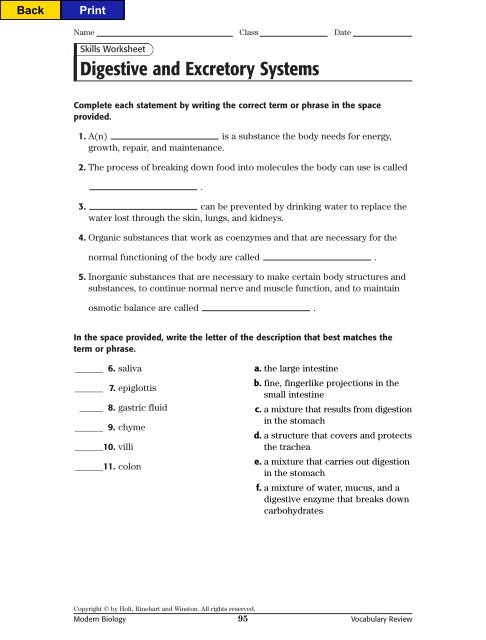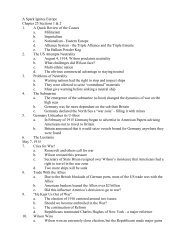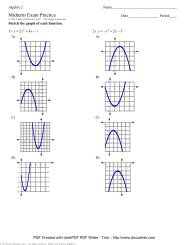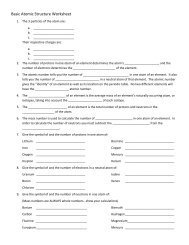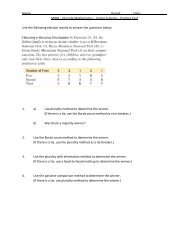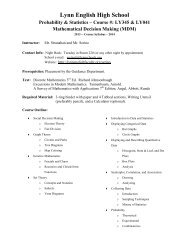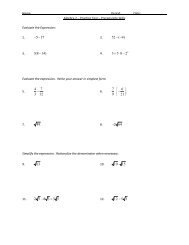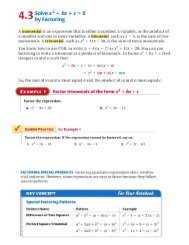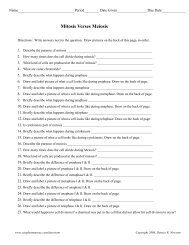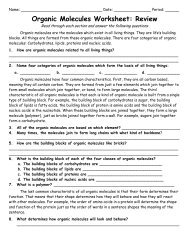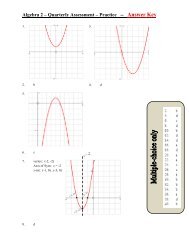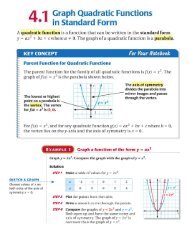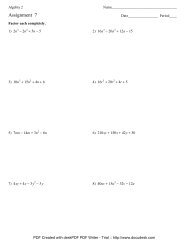Digestive/Excretory Worksheet - Lynn English Faculty Websites
Digestive/Excretory Worksheet - Lynn English Faculty Websites
Digestive/Excretory Worksheet - Lynn English Faculty Websites
Create successful ePaper yourself
Turn your PDF publications into a flip-book with our unique Google optimized e-Paper software.
Name Class Date<br />
Skills <strong>Worksheet</strong><br />
<strong>Digestive</strong> and <strong>Excretory</strong> Systems<br />
Complete each statement by writing the correct term or phrase in the space<br />
provided.<br />
1. A(n) is a substance the body needs for energy,<br />
growth, repair, and maintenance.<br />
2. The process of breaking down food into molecules the body can use is called<br />
.<br />
3. can be prevented by drinking water to replace the<br />
water lost through the skin, lungs, and kidneys.<br />
4. Organic substances that work as coenzymes and that are necessary for the<br />
normal functioning of the body are called .<br />
5. Inorganic substances that are necessary to make certain body structures and<br />
substances, to continue normal nerve and muscle function, and to maintain<br />
osmotic balance are called .<br />
In the space provided, write the letter of the description that best matches the<br />
term or phrase.<br />
______ 6. saliva<br />
______ 7. epiglottis<br />
_____ 8. gastric fluid<br />
______ 9. chyme<br />
______10. villi<br />
______11. colon<br />
a. the large intestine<br />
b. fine, fingerlike projections in the<br />
small intestine<br />
c. a mixture that results from digestion<br />
in the stomach<br />
d. a structure that covers and protects<br />
the trachea<br />
e. a mixture that carries out digestion<br />
in the stomach<br />
f. a mixture of water, mucus, and a<br />
digestive enzyme that breaks down<br />
carbohydrates<br />
Copyright © by Holt, Rinehart and Winston. All rights reserved.<br />
Modern Biology 95 Vocabulary Review
Name Class Date<br />
<strong>Digestive</strong> and <strong>Excretory</strong> Systems continued<br />
Use the terms from the list below to fill in the blanks in the following passage.<br />
excretion ureters urinary bladder<br />
nephrons urethra urine<br />
urea<br />
The process that rids the body of toxic chemicals, excess water, salts, and<br />
carbon dioxide and that maintains osmotic and pH balances is called<br />
(12) . The organs of excretion are the lungs, the kidneys,<br />
and the skin. The liver plays a role in excretion because it converts ammonia,<br />
a toxic nitrogen-containing waste, to (13)<br />
, which is a<br />
much less toxic waste.<br />
The tiny tubes in the kidneys with cup-shaped capsules surrounding<br />
a tight ball of capillaries that filter wastes from the blood are<br />
(14) . These tubes retain useful molecules, and they<br />
produce (15)<br />
the (16)<br />
. Urine is carried from the kidneys into<br />
by tubes called<br />
(17) .Urine leaves the body through a tube called the<br />
(18) .<br />
Copyright © by Holt, Rinehart and Winston. All rights reserved.<br />
Modern Biology 96 Vocabulary Review
TEACHER RESOURCE PAGE<br />
11. B cells<br />
12. helper T cells<br />
13. antigens<br />
14. plasma cells<br />
15. antibodies<br />
16. e 21. b<br />
17. f 22. h<br />
18. c 23. d<br />
19. g 24. a<br />
20. i 25. j<br />
<strong>Digestive</strong> and <strong>Excretory</strong><br />
Systems<br />
1. nutrient<br />
2. digestion<br />
3. dehydration<br />
4. vitamins<br />
5. minerals<br />
6. f<br />
7. d<br />
8. e<br />
9. c<br />
10. b<br />
11. a<br />
12. excretion<br />
13. urea<br />
14. nephrons<br />
15. urine<br />
16. urinary bladder<br />
17. ureters<br />
18. urethra<br />
Nervous System and Sense<br />
Organs<br />
1. d 6. c<br />
2. f 7. i<br />
3. b 8. g<br />
4. e 9. h<br />
5. a<br />
10. motor neuron<br />
11. cerebrum<br />
12. central nervous system<br />
13. thalamus<br />
14. peripheral nervous system<br />
15. hypothalamus<br />
16. interneurons<br />
17. brain stem<br />
18. cerebellum<br />
19. reflex<br />
20. e<br />
21. a<br />
22. c<br />
23. f<br />
24. b<br />
25. d<br />
26. tolerance<br />
27. depressant<br />
28. stimulant<br />
29. psychoactive drugs<br />
30. withdrawal<br />
31. dependence<br />
Endocrine System<br />
1. f 9. l<br />
2. i 10. n<br />
3. d 11. j<br />
4. m 12. o<br />
5. k 13. b<br />
6. g 14. h<br />
7. e 15. c<br />
8. a<br />
Reproductive System<br />
1. seminal vesicles<br />
2. vas deferens<br />
3. testes<br />
4. prostate gland<br />
5. semen<br />
6. bulbourethral glands<br />
7. seminiferous tubules<br />
8. penis<br />
9. epididymis<br />
10. b<br />
11. g<br />
12. c<br />
13. f<br />
14. d<br />
15. a<br />
16. e<br />
17. h<br />
18. ovulation<br />
19. ovaries<br />
20. ovarian cycle<br />
21. ovum<br />
22. corpus luteum<br />
23. follicle<br />
24. uterus<br />
25. menstruation<br />
26. vagina<br />
27. fallopian tube<br />
28. menstrual cycle<br />
29. follicular phase<br />
30. luteal phase<br />
Copyright © by Holt, Rinehart and Winston. All rights reserved.<br />
Modern Biology 112 Answer Key


